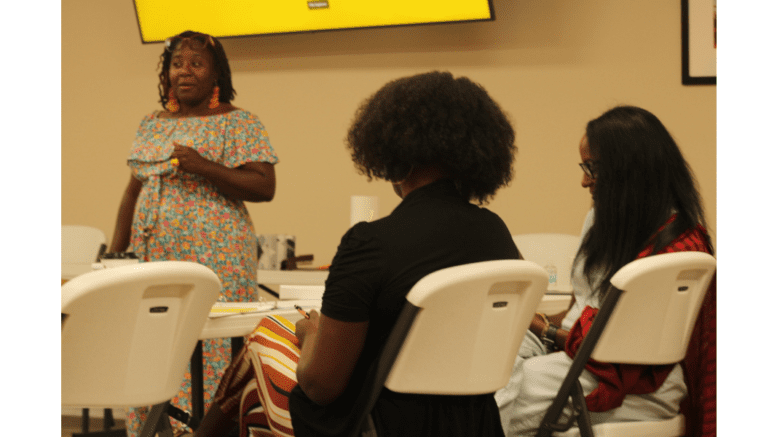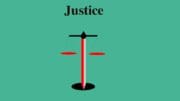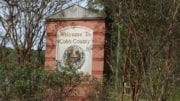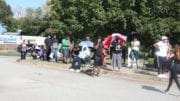By Arielle Robinson
Two Cobb women were selected to participate in the Working Family Party’s “Bet on Us” training program, which prepares Black women and nonbinary people for involvement in politics and community organizing.
The two-day annual event began Friday in Atlanta and brought in 12 Black women and nonbinary people from across the southeast.
There, what the WFP calls the candidate cohort, learned helpful skills to advance in the political world.
Participants learned about strategy and communication methods, Black women in politics, and self-care methods to use when dealing with the stressful work of being in politics.
After the training is over, participants continue with the program online, learning about topics such as fundraising, organizing digitally, and more. The last meeting will be in November in person after the elections are over.
“Bet on Us was created because oftentimes…Black women are asked to save our democracy,” WFP Southeast Regional Director Britney Whaley said. “They’re asked to register our voters, they’re asked to turn people out to the polls, and they do a lot of work and are often referred to as the backbone of the Democratic party.”
In 2020, about 90 percent of Black women across the United States voted for Joe Biden, helping to send him and the first Black woman vice president to the White House.
Black women have been a loyal voting base for the Democrats for quite some time.
Despite this, some of the women at Friday’s event expressed frustration in that much-needed reforms around racism and other issues Black women must deal with are not taking complete precedence among elected Democratic officials.
Whaley said that it is time Black women and nonbinary people run for political office to advance a more just society.
“We created Bet on Us because we think it’s time for folks to bet on us,” Whaley said. “It’s an investment in Black women and Black nonbinary people to hold these leadership roles, to run for office, to organize their communities.”
Obstacles like racism, misogyny, and not coming from wealthy, well-connected backgrounds can stand in the way of Black women running for office.
Bet on Us, created in 2019, hopes to shatter these obstacles.
“If you want to run a campaign, you should be able to do that in your home city and state and not worry about not having access to the tools…Bet on Us was created as the space for Black women to grow their political consciousness. We would love to see it flourish into a space where we have politically activated and educated Black folks who are mobilizing, organizing, and running for office,” Whaley said.
WFP is a political party that according to Whaley, seeks to build a multiracial working-class populist movement with an emphasis on populations of people who have historically been excluded from politics.
WFP started in Georgia in 2017 during Stacey Abrams’ initial gubernatorial run.
They endorse certain candidates, work on leadership development, and generally offer their programs for free. There was an application process for participants in the Bet on Us program.
Whaley said WFP uses the Democratic party line to run progressive candidates.
Successful examples of Black women who went through the Bet on Us program include Dr. Tarece Johnson and state Rep. Regina Lewis-Ward. The former became the first Black woman to serve as chair of the Gwinnett County Board of Education.
Whaley said Bet on Us emphasizes building grassroots, community ties within politics, avoiding an extraction model where candidates only show up in communities around election season.
“Most of what we do is teach [participants] how to run a campaign in a way where it’s not me just coming to you for a vote, but it’s me opening up government to people and learning about what you want to see in leadership and what policies you want to see enacted, because we want to move toward a co-governing model,” Whaley said.
Laura Judge is a Cobb County parent and anti-racist advocate who has spoken at Cobb Board of Education meetings numerous times.
She said there is a political atmosphere across the country but especially in Cobb where Black women in office are not treated fairly.
Judge said that as a Black woman, it often feels as if she has to prove herself to get ahead in work and politics.
“[People] feel like you’re an affirmative action hire or affirmative action candidate, so you’re always trying to prove something,” Judge said. “But you’re just as qualified as your peers or other candidates that are trying to do the same thing. That’s something that’s good about this space, is that a lot of these women have felt similar experiences.”
Kimberly Haase is a businesswoman from Acworth and ran for office for the first time last November against longtime Acworth Alderman Tim Richardson.
Haase lost but came within 117 votes of Richardson.
Haase said Bet on Us has taught her issues that people do not typically learn about in school. She said that there should be more places for Black women to go to for help and support.
“I’m a firm believer in empowering the community and empowering the people in the community of Acworth to know that you can make a change,” Haase said. “Now, with what I’ve been learning, I believe that I can be better equipped.”

Arielle Robinson is a student at Kennesaw State University. She also freelances for the Atlanta-Journal Constitution and is the former president of KSU’s chapter of the Society of Professional Journalists as well as a former CNN intern. She enjoys music, reading, and live shows.





